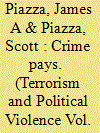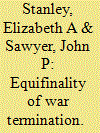| Srl | Item |
| 1 |
ID:
172196


|
|
|
|
|
| Summary/Abstract |
What impact does engagement in crime have on terrorist group survival? In theory criminal activity may decrease group survival by damaging group legitimacy or prompting government crackdowns. Conversely, crime might boost group survival by facilitating access to revenues or by further taxing state policing capacity. Moreover, different types of crime might have different effects. We investigate the impact of crime on terrorist group survival using cross-sectional data on 578 terrorist groups observed between 1970 and 2007. We find that engagement in crime reduces a group’s chance of demise by around 50% and extends its lifespan by around 7 years on average. Terrorist groups involved in narcotics are less likely to end by police or military force, but are also less likely to win political concessions. We find that groups involved in extortion live the longest and are also less likely to end by force or by splintering.
|
|
|
|
|
|
|
|
|
|
|
|
|
|
|
|
| 2 |
ID:
091600


|
|
|
|
|
| Publication |
2009.
|
| Summary/Abstract |
The authors' theory contributes an alternative domestic politics pathway to traditional bargaining models of war termination. In bargaining models, the rational updating process that produces an overlapping bargaining space can develop a significant lag, which extends the war beyond a logical ending point. The authors posit that a change in the domestic governing coalition is often necessary to kick-start this updating process once it has become bogged down through preference, information, and entrapment obstacles. The authors demonstrate that domestic coalition shifts are a critical path to peace, using survival analysis techniques on Bennett and Stam's (1996) war-level data set of wars (1862-1990) and a new belligerent-level data set of wars (1945-2006). These tests show that because war policies can become institutionalized over time, there is a very strong link between coalition shifts and war termination.
|
|
|
|
|
|
|
|
|
|
|
|
|
|
|
|
| 3 |
ID:
117636


|
|
|
|
|
| Publication |
2012.
|
| Summary/Abstract |
We examine the determinants of the likelihood and duration of grain bank survival using survey data from Orissa. The study is motivated by the fact that a large share of grain banks have ceased to function over time. It is also motivated by the fact that despite the high rate of failure, the Government of India and rural development non-governmental organisations are continuing to scale up their grain bank activities. We find that village characteristics appear to matter for both the likelihood and duration of grain bank survival, whereas grain bank member characteristics and grain bank institutional features largely do not appear to matter. The findings suggest the salience of programme placement for grain bank sustainability.
|
|
|
|
|
|
|
|
|
|
|
|
|
|
|
|
| 4 |
ID:
089580


|
|
|
|
|
| Publication |
2009.
|
| Summary/Abstract |
The goal of this study is to assess the dynamics of rural households' labor market participation in the wake of China's efforts to develop rural labor markets in a manner that is conducive to its transition to a market economy. Based on a theoretical model that emphasizes the impact of duration, i.e. of the number of years households spent part-time farming or full-time farming, respectively, we investigate the shifts between these two states. We also identify socioeconomic factors that determine these shifts. The empirical study is based on discrete time hazard approaches, using micro-level panel data from Zhejiang, Hubei, and Yunnan provinces from 1995 to 2002.
|
|
|
|
|
|
|
|
|
|
|
|
|
|
|
|